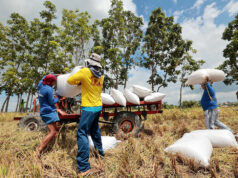THE Department of Trade and Industry said it expects inflation to ease in two or three months based on the expected arrival of commodity imports, which will boost domestic supply and ease price pressures.
Trade Secretary Ramon M. Lopez said in a recording sent to reporters on Wednesday that if the commodities arrive as expected and retailers receive the goods “in two or three months, we hope we can start to feel a tapering off of inflation.”
On Tuesday, the Philippine Statistics Authority reported a 5.7% inflation rate for July, the seventh consecutive year-on-year rise.
The PSA attributed the July rate to price gains in food and non-alcoholic beverages (up 7.1%, compared with 6.1% in June 2018); alcoholic beverages and tobacco (21.5%, from 20.8%); transport (7.9%, from 7.1%); housing, water, electricity, gas, and other fuels (5.6%, from 4.6%); and health (3.7%, from 2.7%).
Mr. Lopez noted that he is receiving complaints of high retail prices for agricultural products which have low farm gate prices.
“We need to speak with the traders about that. We’re going to ask them to police themselves and not take advantage of the situation and to make sure that the supply will always be there for the retailers,” he said.
He acknowledged that some commodities are in short supply, such as sugar, and expressed support for lowering tariffs on some agricultural products and implementing a system that will allow imports to go directly to retailers.
“When we talk of importation, we need to ensure that it will really go to the retailers or industrial users. For example, when we talk of importing sugar, it should not be limited to a few traders or millers. It should be open to all,” he said.
On Monday, the Department of Agriculture said it is considering reviewing the issuance of sugar import permits, noting that the current process of coursing the permits through planters associations and traders takes time and imposes additional costs. — Janina C. Lim



